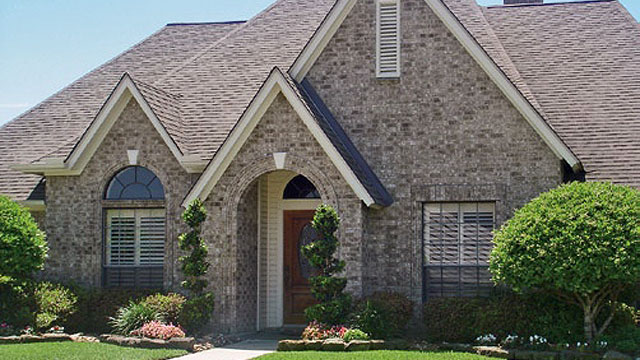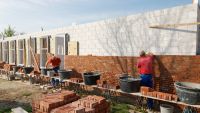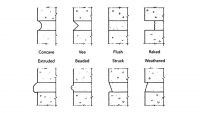March 26, 2012 1:00 PM CDT
The masonry requirements for both new commercial and residential construction are included in the city’s new Unified Land Development Code (ULDC), which the City Council approved on Feb. 23, 2012, culminating a three-year review process.
In adopting the ULDC, Baytown, pop. 72,000, joins a growing list of more than 150 Texas cities that have incorporated exterior masonry construction requirements into community planning, according to the Texas Masonry Council.
The City Council appointed a six-member ULDC Citizen Task Force to prepare and recommend a unified land development code. The Task Force first met January 15, 2009 and has held over 70 public meetings to date. The city’s Planning & Zoning Commission also has held more than 25 meetings on the ULDC.
Under the adopted ULDC, new construction in Baytown will be required to have the following percentages of masonry materials on exterior walls:
For much of its history, Baytown offered a diverse mix of housing for a broad demographic range of residents. In recent decades, however, the newer planned communities of Kingwood and Friendswood, both funded in part by major oil companies, attracted many folks who might otherwise have settled in Baytown. As a result, the quality of the housing mix in Baytown has declined, according to several studies.
The city began revising its land use regulations as part of its strategy to: level the playing field for developers; restore diversity and quality to the housing stock, and grow the tax base, said Kelly Carpenter, Baytown’s director of Planning and Development Services.
“One of the charges of the ULDC process,” Carpenter said, ”was to find ways to have higher standards for development in order to improve the quality of life and grow the tax base. We felt masonry requirements would help achieve those goals.”
A University of Michigan study of masonry ordinances in four Illinois towns concluded that such ordinances result in: 1) higher overall property values; 2) growth in the tax base, lessening the tax burden on residents; 3) continued population and housing growth, and 4) no significant impact on affordability for either renters or buyers of housing.
Research also has shown that masonry (brick, stone, concrete block) provides greater protection against fire, and windstorms, such as tornadoes and hurricanes, than non-masonry siding products.
Rudy Garza, executive vice president of the Texas Masonry Council, said, “Texas has a rich history of building with long-lasting masonry products. Masonry is part of the Texas heritage, and by embracing masonry planning, local officials and civic leaders, such as those in Baytown, are helping to build a strong legacy for their communities.“
Baytown embraces masonry construction
New requirements aim to boost long-term value
By Rudy Garza

The Baytown, Texas, City Council has approved masonry requirements.
The Baytown, Texas City Council has approved this Houston-area city’s first-ever masonry requirements, as part of a strategy to enhance the refinery town’s tax base, image, and quality of life, notes the Texas Masonry Council, which advocates masonry planning as a strategy for sustainable development.The masonry requirements for both new commercial and residential construction are included in the city’s new Unified Land Development Code (ULDC), which the City Council approved on Feb. 23, 2012, culminating a three-year review process.
In adopting the ULDC, Baytown, pop. 72,000, joins a growing list of more than 150 Texas cities that have incorporated exterior masonry construction requirements into community planning, according to the Texas Masonry Council.
The City Council appointed a six-member ULDC Citizen Task Force to prepare and recommend a unified land development code. The Task Force first met January 15, 2009 and has held over 70 public meetings to date. The city’s Planning & Zoning Commission also has held more than 25 meetings on the ULDC.
Under the adopted ULDC, new construction in Baytown will be required to have the following percentages of masonry materials on exterior walls:
- Non-residential – up to 80 percent on the front and up to 70 percent on sides, with trade offs for increases in landscaping for a lower percentage of masonry;
- Single-family Residential – minimum 60 percent;
- Multi-family Residential – 60 percent of first floor walls, 30 percent of all walls above.
For much of its history, Baytown offered a diverse mix of housing for a broad demographic range of residents. In recent decades, however, the newer planned communities of Kingwood and Friendswood, both funded in part by major oil companies, attracted many folks who might otherwise have settled in Baytown. As a result, the quality of the housing mix in Baytown has declined, according to several studies.
The city began revising its land use regulations as part of its strategy to: level the playing field for developers; restore diversity and quality to the housing stock, and grow the tax base, said Kelly Carpenter, Baytown’s director of Planning and Development Services.
“One of the charges of the ULDC process,” Carpenter said, ”was to find ways to have higher standards for development in order to improve the quality of life and grow the tax base. We felt masonry requirements would help achieve those goals.”
A University of Michigan study of masonry ordinances in four Illinois towns concluded that such ordinances result in: 1) higher overall property values; 2) growth in the tax base, lessening the tax burden on residents; 3) continued population and housing growth, and 4) no significant impact on affordability for either renters or buyers of housing.
Research also has shown that masonry (brick, stone, concrete block) provides greater protection against fire, and windstorms, such as tornadoes and hurricanes, than non-masonry siding products.
Rudy Garza, executive vice president of the Texas Masonry Council, said, “Texas has a rich history of building with long-lasting masonry products. Masonry is part of the Texas heritage, and by embracing masonry planning, local officials and civic leaders, such as those in Baytown, are helping to build a strong legacy for their communities.“
About the Author
Rudy Garza is the Executive Vice President of the Texas Masonry Council.


















